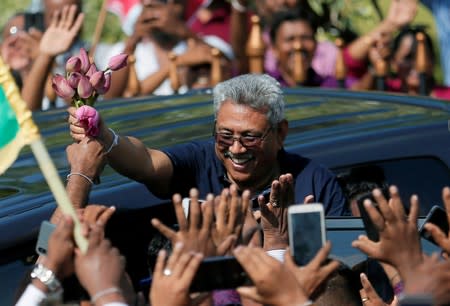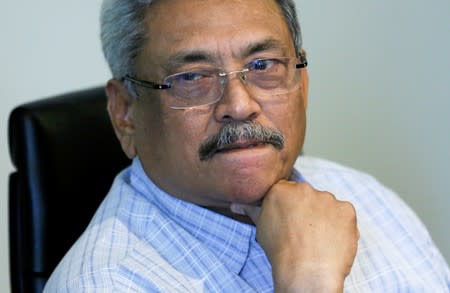Sri Lankan presidential hopeful Gotabaya Rajapaksa renounces U.S. citizenship
COLOMBO (Reuters) - Gotabaya Rajapaksa, younger brother of opposition leader and former President Mahinda Rajapaksa, has renounced U.S. citizenship, paving the way for him to make a bid for his country's presidency.
Sri Lanka does not allow dual citizenship and foreign nationals cannot contest elections.
Gotabaya, a defense chief during the civil war that ended in 2009, announced in late April that he would run in the presidential election due later this year.
He is popular among Sri Lanka's politically powerful Sinhala Buddhist majority, which accounts for 70 percent of the country's 21 million population.
His brother Mahinda Rajapaksa served as president for a decade and now leads the opposition after a failed attempt to return to power last year as prime minister, declared unconstitutional by the Supreme Court.
"I can say Gotabaya Rajapaksa has renounced his U.S. citizenship," another brother, Basil Rajapaksa, a former economy minister, told a news conference on Thursday.
Basil Rajapaksa's party, Sri Lanka Podujana Peramuna, is widely expected to nominate Gotabaya as its candidate for the presidential election on August 11. Mahinda Rajapaksa will be named as party chief the same day, Basil said.
The U.S. Department of State declined to comment on Gotabaya Rajapaksa's citizenship.
As defense chief in his brother's government, Gotabaya Rajapaksa was credited with having crushed the Tamil Tiger insurgent group in the war that ended in 2009. He has also been accused of human rights violations, especially in the closing stages of the 26-year war, which he denies.
He is facing war-related lawsuits in the United States, claims that had earlier been expected to delay the process of him dropping U.S. citizenship.
(Reporting by Shihar Aneez; Editing by Sankalp Phartiyal and Stephen Powell)


